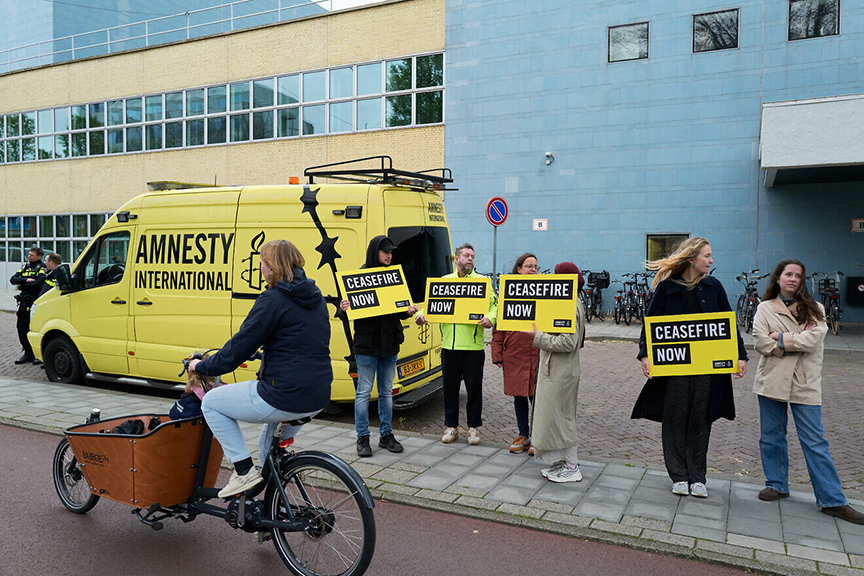Israel’s missed opportunity in Iran

An Israeli Air Force fighter jet taking off for a mission. Credit: IAF.
by Jonathan Feldstein
Over the weekend, Israel launched a major attack on Iranian military sites that’s being hailed as a wide success for its breaching all the Iranian air defenses, hitting multiple targets, and returning home safely. As many as 100 Israeli aircraft participated, flying 1000 or so miles each way.
Simply coordinating it all was a herculean task, not to mention its precision, executed to prevent Iran’s attack capabilities and weapons development, while minimizing civilian casualties. This the polar opposite to the Iranian attacks on Israel, which had millions of civilians and civilian structures in the crosshairs.
It’s noteworthy that Israel openly took credit for this attack, announcing the launching of the attack, the safe return home of all its planes, and even reportedly warning the Iranians in advance what the targets would be. These were coordinated and implemented with precision despite a treacherous U.S. leak of top-secret information about Israel’s planned attack, and with no reported civilian casualties.
Israel’s attack is being hailed as “historic,” “precise,” “powerful,” and having “met all objectives.”
The outcome of the attack is being called a “setback,” “crippling,” and “disabling” to the Islamic regime, leaving Iran “vulnerable,” having hit the “backbone of Iran’s missile industry.”
In parallel to this apparent success, Israeli news reports are echoing that an Iranian reprisal is now anticipated, as early as this week.
The attack was indeed a wide success for what it was, but a tremendous, missed opportunity for what could, and should have been: eliminating the Iranian Islamic regime threat once and for all. In this light, it’s important to look at Israel’s attack not as a reprisal, but of preventative deterrence.
While there can be many ways to eliminate the threat, what should be happening is that the U.S. should be stepping up to play an active role, regardless of who wins the presidential election, or the consequences of doing so on the election.
While it’s anticipated that Kamila Harris would be weak on Iran, continuing the Obama-Biden policy of appeasement and even enabling and paying off the Iranians, she should be held accountable to her remarks in a “60 Minutes” interview, identifying Iran as the biggest threat. She should be pressed on how she would eliminate that threat, not letting the Islamic regime grow new tentacles. It should be bi-partisan U.S. policy.
In numerous interviews leading up to the anticipated Israeli attack, I have been asked what Israel’s response ought to be. Barring any military or intelligence background, and while there are many considerations as to how to eliminate the Iranian threat, to me Iran’s nuclear sites should have been target number one. This is Israel’s biggest existential threat, one that Iran has been allowed to strengthen, and must be eliminated, not enabled.
Second, all major Iranian Revolutionary Guard sites and leaders should be eliminated. They not only are the fist that controls the cash and weapons to its terrorist proxies, it is a national terror group with massive power and control over the Iranian people yearning to break free of their tyranny.
I would have eliminated the Supreme Leader himself, the brain of the head of the octopus. His death would not just be symbolic, but strategic. If Israel was able to take out Hezbollah leader Hassan Nasrallah in his Beirut bunker, Yahya Sinwar in Gaza, and Hamas leader Ismail Haniyeh in the heart of Tehran, Israel can and should find and eliminate Ayatollah Khamenei as well.
It is important not just to hit the Islamic regime hard to eliminate the existential threat to Israel, but to hit them so hard that the Iranian people can rise up and take back their country from the Islamists who hijacked Iran 46 years ago. Unless the Iranians do attack Israel again with hundreds more ballistic missiles, this may have been a once in a lifetime opportunity that’s now missed. To think that the Iranians won’t rebuild (and since Israel didn’t target their energy infrastructure which funds the regime, on top of billions of dollars from obscene U.S. pandering and outright complicity), they will have the resources to build up again.
Rather than the U.S. reportedly holding Israel back, this was the opportunity to put the final nails in the ayatollahs’ coffin. I’m disappointed we didn’t finish the job but seem to have kicked the can down the road.
In addition to the need for prevention and deterrence, Israel has the greatest case for legitimacy of such a bold series of strikes following two direct and unprecedented attacks by Iran, one in April and one in October, totaling several hundred missiles and drones. Accordingly, this may have been the best opportunity to do so, albeit that Israel would have been met with criticism and condemnation.
The fact that Israel responded to the April attack in a way that was muted, also gives Israel greater legitimacy to respond forcefully following the second attack. Doing so would deter if not eliminate Iran’s opportunity to attack yet again.
It’s also been argued that anything but a forceful attack would incentivize Iran to attack again because they have little to lose, they don’t care about innocent civilians in Israel, Iran, or anywhere, and their goal is an Armageddon-style destruction of Israel. Anyone who doubts the Iranian intention, or that they won’t use a nuclear weapon if they could, is delusional.
A potential downside of attacking the Iranian nuclear sites is that anything not destroyed could be used in a sprint to cross the nuclear threshold to prevent Israel from attacking again.
Another downside is the Biden administration making it widely clear, and public, that it opposed an Israeli attack on Iranian nuclear targets. US pressure (likely influenced by the election) was evident, and is presumed to have included threats to withhold weapons to Israel as the stick, while dangling the carrot of deploying the THAAD missile defense system to Israel.
Israel’s attack did not behead the Iranian terrorist octopus, but hit them in a way from which they can still recover, and regenerate their strength and harmful evil influence. Israel would be first to suffer the consequences of a legitimate attack to eliminate the threat, and that’s no little thing.
Barring doing so, Iran remains able to do major damage on its own and through its proxies, and this was a missed opportunity.
Jonathan Feldstein was born and educated in the U.S. and immigrated to Israel in 2004. He is married and the father of six, and a growing number of grandchildren. He has become a respected bridge between Jews and Christians and serves as president of the Genesis 123 Foundation, www.Genesis123.co, and recently published “Israel the Miracle,” featuring 75 essays by Christian leaders around the world writing why Israel is so significant. He writes regularly on major Christian websites around the world about Israel, sharing unique experiences of living as an Orthodox Jew in Israel. He is host of the popular Inspiration from Zion podcast. He can be reached at firstpersonisrael@gmail.com.



